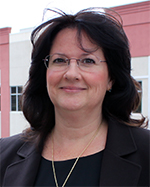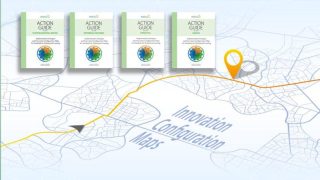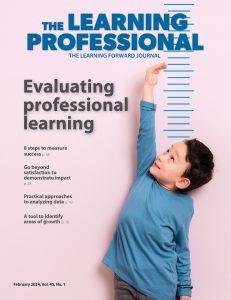Powerful school leadership is critical for schools to be successful. Effective principals ensure that great teaching and learning is in place for all students – a complex undertaking with many moving parts. To help principals succeed in that role, three years ago I formed a Principal Study Council that provides an opportunity for principals to network and learn together with a focus on improving student achievement.
''When principals support each other, they can find great strength. And when #principals feel empowered, they can in turn impact others – teachers, staff, students, & the community.'' @AppolloniAnn Click To TweetThirty to forty principals have participated in the principal study council each year, and they have met both in person and virtually, with a shift to fully virtual over the past year due to the COVID-19 pandemic. Through collaborative study, discourse on research-based practices, and leadership coaching, participating principals learn about systems, structures, and practices that contribute to strong student achievement. They also learn how implementation of those success factors can look different in various school settings. This allows them to examine their leadership in these areas and understand what they are doing well and where to make change.
The concept and implementation of the study council draws from Learning Forward’s Standards for Professional Learning that outline the elements of and conditions for professional learning that result in improved educator practices and better student outcomes (Learning Forward, 2011). The study council is also grounded in the Pennsylvania leadership standards which are centered around knowledge and skills to think and plan strategically, creating an organizational vision around student success, understanding of standards-based systems theory and design, and the ability to transfer knowledge and use appropriate data to inform decision making (Pennsylvania Department of Education, 2020).
One of the structures of the study council meetings that encourages this kind of reflection is a dedicated networking time, when principals can share goals, challenges, and strategies. When approaching sensitive topics such as adverse childhood experiences and social and emotional wellness, principals can make connections and grow in their understanding by talking with other principals who face the same challenges. Principals also give one another constructive feedback, which provides a type of formative assessment that principals use to refine their leadership practices and sustain desired changes over time.
Lessons learned
This collaborative learning has been powerful for all of us involved. It has shown that, together, principals can create a strong climate conducive to success for all students. Our work has yielded the following key lessons about how to make that happen.
Shared goals lead to clarity of vision.
When a learning community identifies shared goals for student and educator learning, its members can focus their efforts and extend their knowledge. These shared goals can help principals develop clarity around the vision for their own staff, students, and community and ultimately reach their schools’ goals. Some professional learning occurs individually within the council, particularly to address individual development goals. But the more a principal’s learning is shared and supported by others, the more quickly the culture of continuous improvement, collective responsibility, and high expectations for students and educators grows. Collective responsibility and participation foster peer-to-peer support for learning and a consistent focus on shared goals within and across communities (Learning Forward, 2020).
Common challenges create shared strength.
Principals are facing enormous challenges, and it is important for them to know that they are not alone. Education has been turned on its head as schools work to provide new types of educational experiences, and principals have needed to focus on a wide range of issues, including staffing, building relationships with students, implementing curriculum, instruction, and assessment in a different way than in the past – all while navigating shifting health and safety guidelines. The opportunity to discuss these challenges and decision-making processes for addressing them was invaluable for principals. It gave them strength and support, and also helped them see silver linings and positive changes that they would like to sustain moving forward. Among these are virtual meetings with families, software applications and learning management systems for formative assessments, and online clubs and organizations for students so that everyone has a chance to participate. Sharing those opportunities with one another provided principals with inspiration and encouragement.
Principals can share strategies for their own health and wellness with one another.
Principals are used to putting the needs of their students, families, and staff first. While principals could readily share what they were doing for all of their constituents, they often had to stop and think about what they were or could be doing for themselves. Putting their “own oxygen mask on first” seemed a challenge for them. During the principal study council meetings, a principal could learn from another principal ways to weave opportunities into their long days to be mindful of self-care.
Principals’ perspectives
At the conclusion of each school year, I survey the principals in the study council to solicit feedback and topics of interest for the upcoming year. Principals who participated during the 2020-21 school year reported that they appreciated informal opportunities to share with one another, formal structures for learning and problem-solving, peer coaching, and opportunities to celebrate achievements and successes. All principals reported that the council was helpful, and the majority wanted to increase the frequency of the meetings as well as visit one another’s buildings to engage with teachers and students. They found the council particularly helpful for examining equity, understanding the effects of emotions and trauma on students and staff, building their collaboration skills, and preparing them to supervise other principals in their districts.
Empowerment in action
Quality leadership and a continuous learning ethic are key pillars of a successful education system. That takes reciprocal support and empowerment through high-quality, collaborative professional learning. Through the principal study council, I have seen empowerment in action. When principals support each other, they can find great strength. And when principals feel empowered, they can in turn impact others – teachers, staff, students, and the community.








